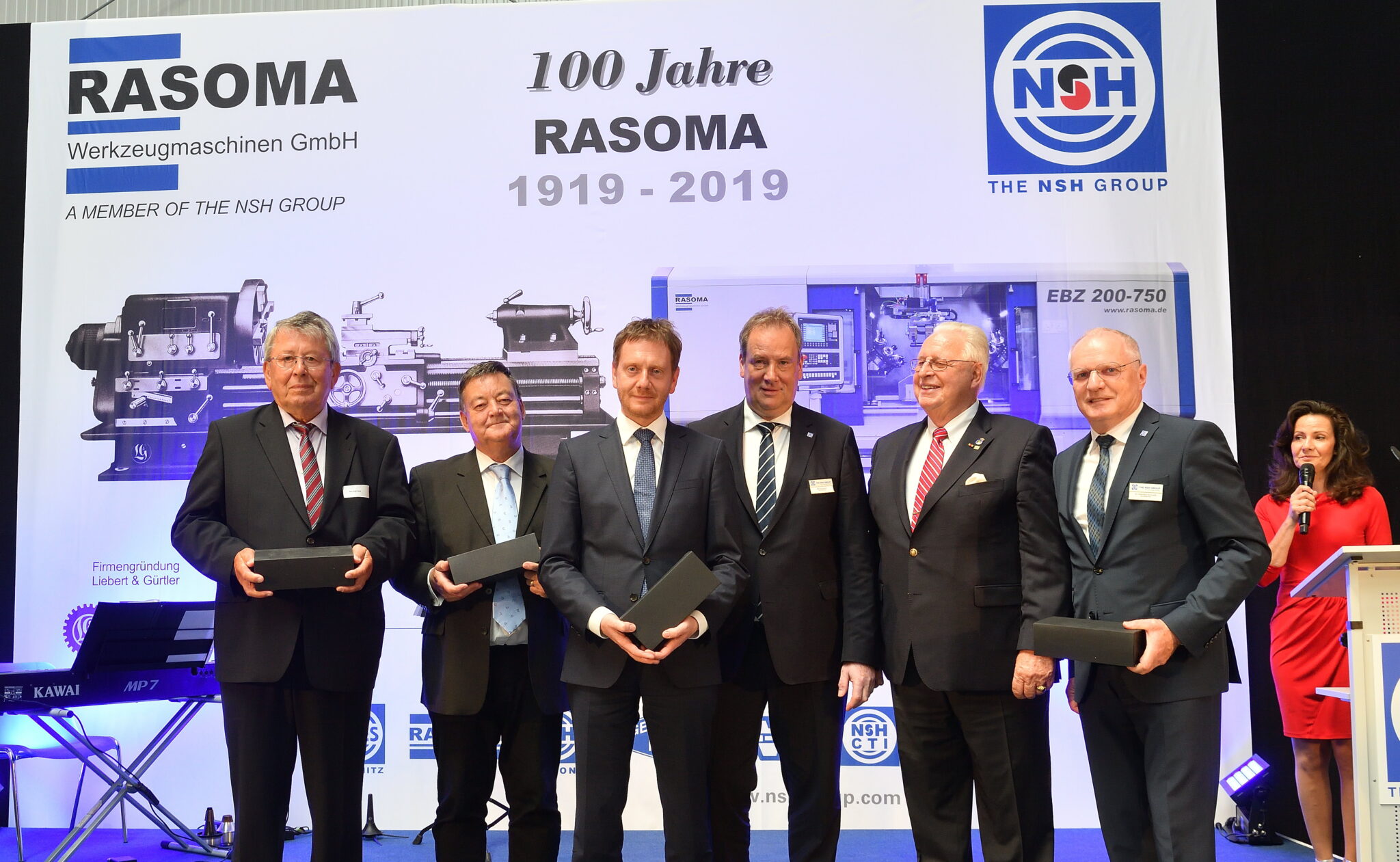We congratulate on 100 years of RASOMA – A success story of the courage to rise up again.
About 100 invited guests, including Prime Minister Michael Kretschmer, NSH shareholder and Chairman of the Board Prof. Dr.-Ing. E.h. Hans J. Naumann and the Mayor of the City Döbeln Hans-Joachim Egerer, accepted the invitation to the 100th anniversary of RASOMA Machine Tools GmbH – which was for good reason. RASOMA not only celebrated an anniversary, but also its history of courage to rise again, even after serious setbacks. We take this as an opportunity and take a look at their history.
This begins with Johannes Liebert and Arthur Gürtler. On 29 May 1919 they acquired a factory property and began to build flat grinding machines and, after a short time, various lathes. A success story begins. Only ten years later, the 2000th lathe left the factory. On average this means 16 machines per month since 1919. The legendary VDF standard lathe is also built by Liebert & Gürtler in the early 1940s.
With the capitulation in 1945 the dismantling of the company began and thus the temporary end of mechanical engineering in Döbeln. Only five years later was the company again able to produce a mechanical lathe. It moved upwards again. After the private company was converted into a company with state participation, the production of leading and traction spindle lathes was adjusted in order to concentrate on the automated lathes.
However, the next setback came again. The company was nationalised in 1972 and given the name VEB Werkzeugmaschinenfabrik Döbeln. In 1980 the company was transformed into VEB RASOMA Döbeln in the course of the GDR’s formation of a combine. After unsuccessful attempts by the Treuhand to find an investor, the company is liquidated in 1993. Mr. Jürgen Kamm and Mr. Peter Kaiser subsequently came up with an MBO concept and take over the business. This was the second time that the company was saved from its supposed disappearance. RASOMA Machine Tools GmbH was founded. Shortly thereafter, turning machines were again developed, produced and marketed, initially the vertical turning machine DS 200, which is still being built today – continuously further developed and modernized.
In 2002, the company suffered its third serious setback with a seemingly hopeless future: The company was massively flooded by the huge flood.
»We didn’t know what to do next. We stood up to our knees in the water and nobody knew what will happen next. Even after the water was gone, remained huge mud masses . In our mind we gave up the company«, remembers Managing director Marcus Kamm.
Only a few weeks after the flood, something very impressive happened: the entire workforce showed full readiness to rebuild RASOMA. And not only that:
»We received support from NILES-SIMMONS Industrieanalagen from Chemnitz to rebuild the machines. Even competitors helped us. This is unimaginable today and were very big actions for which we are very grateful« says Kamm.
In the same year machines could be built again due to this helpfulness. In 2004 a new, modern assembly hall was inaugurated. Four years later, new offices for sales were built and another assembly hall was also opened in 2009.
NILES-SIMMONS-HEGENSCHEIDT GmbH also learned of this cohesion and persistence and acquired the majority of the shares in 2016.
»We are proud to have such a traditional company with us in the Group and congratulate them sincerely,« said the NSH shareholder and Chairman often the Board Prof. Dr.-Ing. E.h. Hans J. Naumann.
In the same year, Peter Kaiser said goodbye, who had worked for the company for 60 years and had been managing partner until then.
We, the NILES-SIMMONS Industrieanlagen from Chemnitz, congratulate our colleagues from Döbeln on this great history and wish them all the best for the future challenges and the coming 100 years.
You can find the picture gallery here


